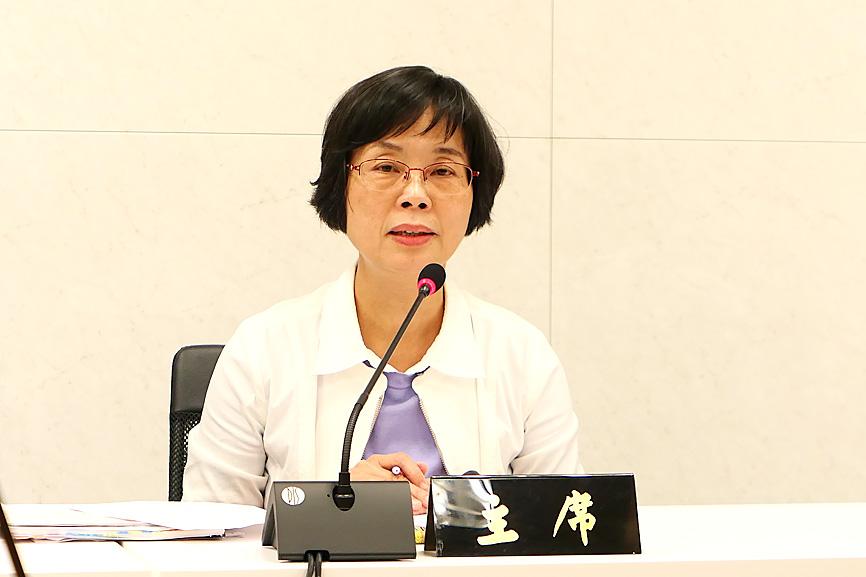Taiwan’s booming stock market contributed to a record quarter of tax revenue, figures released yesterday by the Ministry of Finance showed.
Tax revenue for last month was NT$200.9 billion (US$7.06 billion), up 19.2 percent year-on-year, with cumulative tax revenue from January to March totaling a record NT$467.2 billion, an annual increase of 16.6 percent.
While gift, inheritance, business, alcohol and tobacco, and land value incremental tax revenues all reached double-digit growth in the first quarter, the most remarkable growth was in securities transaction tax revenue, which reached a record NT$55.9 billion in the first quarter, up 102.8 percent year-on-year.

Photo: Wu Chia-jung, Taipei Times
Department of Statistics Deputy Director-General Chen Yu-feng (陳玉豐) said that Taiwan’s booming stock market has resulted in securities transaction tax revenue growing for 18 consecutive months.
“Average daily transactions on the Taiwan Stock Exchange for the first quarter totaled NT$400.7 billion,” Chen said.
Customs tariffs increased 10.3 percent year-on-year to NT$30.9 billion in the first quarter, which Chen attributed to an increase in tariffs on transportation equipment, machinery and food.
While Taiwan’s tax revenue has been increasing as a result of a flourishing economy, Chen said that first-quarter tax revenue was also bolstered by new housing projects in Taipei, New Taipei City, Hsinchu City and Kaohsiung.
“All four cities saw deed taxes grow by more than NT$100 million in the first quarter,” Chen said.
Despite the general uptrend in tax collection, Chen said that this quarter’s record haul would not necessarily guarantee bumper revenues going forward.
“There are a lot of one-time events, such as the completion of housing projects falling in this quarter, that contributed,” she said.
Besides, the first quarter is not the most important tax quarter for the Taiwanese economy, Chen said.
“With income taxes due in May and June, the second quarter is the big one to watch,” she said.

South Korea’s equity benchmark yesterday crossed a new milestone just a month after surpassing the once-unthinkable 5,000 mark as surging global memory demand powers the country’s biggest chipmakers. The KOSPI advanced as much as 2.6 percent to a record 6,123, with Samsung Electronics Co and SK Hynix Inc each gaining more than 2 percent. With the benchmark now up 45 percent this year, South Korea’s stock market capitalization has also moved past France’s, following last month’s overtaking of Germany’s. Long overlooked by foreign funds, despite being undervalued, South Korean stocks have now emerged as clear winners in the global market. The so-called “artificial intelligence

Chinese artificial intelligence (AI) start-up DeepSeek’s (深度求索) latest AI model, set to be released as soon as next week, was trained on Nvidia Corp’s most advanced AI chip, the Blackwell, a senior official of US President Donald Trump’s administration said on Monday, in what could represent a violation of US export controls. The US believes DeepSeek will remove the technical indicators that might reveal its use of American AI chips, the official said, adding that the Blackwells are likely clustered at its data center in Inner Mongolia, an autonomous region of China. The person declined to say how the US government received

‘SEISMIC SHIFT’: The researcher forecast there would be about 1.1 billion mobile shipments this year, down from 1.26 billion the prior year and erasing years of gains The global smartphone market is expected to contract 12.9 percent this year due to the unprecedented memorychip shortage, marking “a crisis like no other,” researcher International Data Corp (IDC) said. The new forecast, a dramatic revision down from earlier estimates, gives the latest accounting of the ongoing memory crunch that is affecting every corner of the electronics industry. The demand for advanced memory to power artificial intelligence (AI) tasks has drained global supply until well into next year and jeopardizes the business model of many smartphone makers. IDC forecast about 1.1 billion mobile shipments this year, down from 1.26 billion the prior

FORTUNES REVERSED: The new 15 percent levies left countries with a 10 percent tariff worse off and stripped away the advantage of those with a 15 percent rate In a swift reversal of fortunes, countries that had been hardest hit by US President Donald Trump’s tariffs have emerged as the biggest winners from the US Supreme Court’s decision to strike down his emergency levies. China, India and Brazil are among those now seeing lower tariff rates for shipments to the US after the court ruled Trump’s use of the International Emergency Economic Powers Act to impose duties was illegal. While Trump subsequently announced plans for a 15 percent global rate, Bloomberg Economics said that would mean an average effective tariff rate of about 12 percent — the lowest since